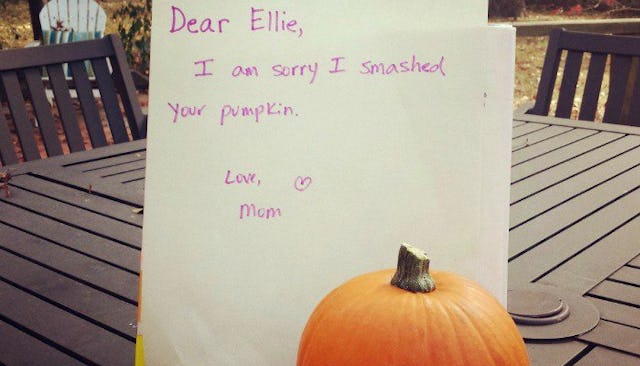I Beg Your Pardon: Asking Our Kids For Forgiveness

At the end of every day dangles a mom hanging on by a thread. A mom who replays the day’s events on a mental loop, eventually narrowing the focus down to a highlight reel. Dissecting what went right and what went wrong—the latter usually outpacing the former 3:1.
A mom who interrupts these silent “I’ll Do It Better Tomorrow” pep talks to scream threats upstairs to her kids that if they don’t get back in bed immediately she’s going to sell them to gypsies. She hears the thud-thud-thud of little footsteps overhead (the very noise she once ferociously prayed for) and wonders if she has one more tuck-in left. A mom who has dug deep into her very being so many times that day for what she fears is the last scrap of patience, she wonders if one night is sufficient time to regenerate enough for the next day.
That mom was me the night of the “incident”—also known to my family, neighbors, and local law enforcement as “The Pumpkin Smash Heard ‘Round The World.” It’s something we all laugh about now, but the event prompted my husband to hide the scissors for a week and a half.
My 6-year-old daughter came home from school with a little pumpkin from her teacher. For the next three hours, my two eldest daughters fought like cats in the backyard, maybe over the pumpkin but more likely over one each other’s very existence. One had a handful of the other’s hair, the other a death grip on the pumpkin. My youngest was throwing a tantrum at my feet. I had a deadline looming and full-throttle PMS. All previous attempts at resolution had failed. I frantically dug deep for patience, but the well was dry, and something inside me snapped.
I’ve heard that when athletes make a big play everything around them goes silent as they are overcome with adrenaline and hyperfocus on the goal. The same thing happened with me and the pumpkin. Without a word, I marched over, and before they knew what was happening, I snatched the pumpkin from their hands, held it over my head—pausing for dramatic effect—eyes bulging, nostrils flared, and from deep in my guts where my give-a-fucks had fled to, I let out a mighty “RRRAAAARRRRRHHHHHH!” while smashing it to smithereens at our feet.
There was stunned silence as I walked away. I was not the least of the stunned at the Hulk-like rage I didn’t know lingered in there. If I was a smoker, this would have been the point where I nonchalantly flipped a lit match over my shoulder and said something super cool as the world exploded behind me.
For a moment, their mouths were frozen agape in silent screams as they stared, confused, at splatters of pumpkin that covered their shoes. The wails started as the back door swung shut.
Once I regained feeling in my fingers and toes, I realized I had just provided an in-the-flesh demonstration of everything I teach my kids not to be. And I wasted no time in walking outside to tell them so—after a few deep breaths and a Zoloft, obviously.
“Girls? Girls! Come down from the tree! I need to talk to you about something!”
“No way! You’re scary!”
The first words out of my mouth were, “I am so sorry. Please forgive me. I was really really mad.” I wanted to add “because you were acting like a bunch of jerks,” but I bit my tongue. I’d save that for a more appropriate time, like their wedding toasts.
I’m sorry. Familiar words since becoming a parent, though not my favorite. Sometimes it’s big stuff like annihilating farm fresh produce as they look on in horror. Sometimes it’s smaller stuff like, “Sorry I accused you of not flushing. I should have recognized that was clearly your sister’s poop in there.”
Asking forgiveness is never easy—it opens us up to vulnerability. Holding hands and looking at pumpkin pieces is a lot harder than quietly sweeping them into the grass and pretending you’re Perfect Pinterest Mom. But we apologize. We show them that we’re not overflowing with patience, because nobody is. We tell them that we don’t always know the perfect thing to do or say, and neither will they. Making mistakes sucks, but own them and move on.
And we teach them that sometimes apologies come with a price—something to keep that in mind if you’ve just gotta smash something.
This article was originally published on